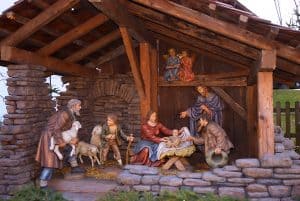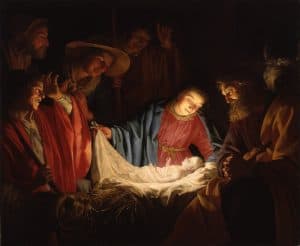Where I found truth, there found I my God, who is the truth itself.
—Augustine—
Key point: To ignore Jesus is to decide against Him; and no wonder, considering who He is, what He came to do, and all He gives to those who trust Him and welcome Him into their lives.
In the passage of Scripture we frequently call “The Christmas Story,” Luke, a physician and careful historian, reports,
2 1And it came to pass in those days that a decree went out from Caesar Augustus that all the world should be registered. 2 This census first took place while Quirinius was governing Syria. 3 So all went to be registered, everyone to his own city.

4 Joseph also went up from Galilee, out of the city of Nazareth, into Judea, to the city of David, which is called Bethlehem, because he was of the house and lineage of David, 5 to be registered with Mary, his betrothed wife, who was with child. 6 So it was, that while they were there, the days were completed for her to be delivered. 7 And she brought forth her firstborn Son, and wrapped Him in swaddling cloths, and laid Him in a manger, because there was no room for them in the inn.
8 Now there were in the same country shepherds living out in the fields, keeping watch over their flock by night. 9 And behold, an angel of the Lord stood before them, and the glory of the Lord shone around them, and they were greatly afraid. 10 Then the angel said to them, “Do not be afraid, for behold, I bring you good tidings of great joy which will be to all people. 11 For there is born to you this day in the city of David a Savior, who is Christ the Lord. 12 And this will be the sign to you: You will find a Babe wrapped in swaddling cloths, lying in a manger.”
13 And suddenly there was with the angel a multitude of the heavenly host praising God and saying:
14 “Glory to God in the highest,
And on earth peace, goodwill toward men!”
15 So it was, when the angels had gone away from them into heaven, that the shepherds said to one another, “Let us now go to Bethlehem and see this thing that has come to pass, which the Lord has made known to us.” 16 And they came with haste and found Mary and Joseph, and the Babe lying in a manger. 17 Now when they had seen Him, they made widely known the saying which was told them concerning this Child. 18 And all those who heard it marveled at those things which were told them by the shepherds. 19 But Mary kept all these things and pondered them in her heart. 20 Then the shepherds returned, glorifying and praising God for all the things that they had heard and seen, as it was told them (Luke 2:1-20).
God Invaded the Ordinary
While Jesus’ birth and the immediate events surrounding it were remarkable in themselves, so, too, was the angelic announcement given to ordinary shepherds. These men’s responses, both collective and individual, however, were quite natural. As Francis Schaeffer says, the shepherds’ “reaction was simple and human: ‘We’ve heard about this thing; let’s go see it.’ In a profound sense, the act of religious intensity is as natural as any other movement of life. And they went to Bethlehem with haste, obviously because of the reality of the situation that confronted them.”1

Let’s reflect for a moment on what the shepherds had seen and heard. The angel had appeared to them unexpectedly and supernaturally, bringing wonderful news, not just for them, but for all people everywhere! That very day in nearby Bethlehem a Savior had been born. Not only was this baby the Savior; He also was “Christ the Lord.” Each of these three titles—Savior, Christ, and Lord—is quite significant. Moreover, around that time, “[t]alk of a Deliverer…was widespread. The Jews in particular were expecting a Deliverer to free them from oppression.” It’s an understatement to say the shepherds couldn’t help but realize this was a very big deal.
How could they confirm the angel’s words? How could they validate them as true? The angel himself had told them, “And this will be the sign to you: You will find a Babe wrapped in swaddling cloths, lying in a manger.” Note that the sign was the baby Himself. Yes, it’s true God’s messenger described and identified the baby as “wrapped in…cloths” and “lying in a manger.” Even so, when they took off to Bethlehem to investigate for themselves, the shepherds were looking for cloths and a manger only as a means to the end of finding the baby they held—the sign and the one about whom the angel had spoken.
RSVP
Here we see that God’s personal revelation of Himself demands a personal response. It is as if God put RSVP on His announcement. The shepherds heard what the angel told them, but it wouldn’t have meant much to them if they didn’t travel to Bethlehem to see this baby for themselves. As natural as their responses were, they acted voluntarily, choosing to go to Bethlehem of their own free wills. The truth is, they could have resolved to stay on the hillside, despite all they’d seen and heard.
Everyone must choose. Not all people will respond to God’s invitation to come to Christ as readily as did the shepherds. In fact, some will feel threatened by Him and lash out against Him. King Herod (also go here) is a great example. He was a big-time loser because of his rejection of Christ—as is everyone who looks away from Him and goes his or her own way.
Keep in mind as well even when rejections are subtle, they’re still rejections. To ignore Christ is to decide against Him. So is postponing a decision repeatedly. Jesus said, “He who is not with Me is against Me, and he who does not gather with Me scatters.” The matter is urgent. Paul wrote, “Now is the accepted time; behold, now is the day of salvation.” The cost of ignoring Christ or of putting off a decision in His favor is very high, indeed!
On the other hand, God welcomes and rewards those who respond positively to His invitation to come into the presence of His Son. Let’s follow the shepherds’ example. They “said to one another, ‘Let us now go to Bethlehem and see this thing that has come to pass, which the Lord has made known to us.’ And they came with haste and found Mary and Joseph, and the Babe lying in a manger.” There He was!

God in the Flesh
Consider what—and whom—the shepherds beheld. This baby was and is the God of the universe. He was God in the flesh—God incarnate. As the apostle Paul later later would write,
 15 He is the image of the invisible God, the firstborn over all creation. 16 For by Him all things were created that are in heaven and that are on earth, visible and invisible, whether thrones or dominions or principalities or powers. All things were created through Him and for Him. 17 And He is before all things, and in Him all things consist. 18 And He is the head of the body, the church, who is the beginning, the firstborn from the dead, that in all things He may have the preeminence.
15 He is the image of the invisible God, the firstborn over all creation. 16 For by Him all things were created that are in heaven and that are on earth, visible and invisible, whether thrones or dominions or principalities or powers. All things were created through Him and for Him. 17 And He is before all things, and in Him all things consist. 18 And He is the head of the body, the church, who is the beginning, the firstborn from the dead, that in all things He may have the preeminence.
19 For it pleased the Father that in Him all the fullness should dwell, 20 and by Him to reconcile all things to Himself, by Him, whether things on earth or things in heaven, having made peace through the blood of His cross (Col. 1:15-20).
Paul also would pen these words.
5 Let this mind be in you which was also in Christ Jesus, 6 who, being in the form of God, did not consider it robbery to be equal with God, 7 but made Himself of no reputation, taking the form of a bondservant, and coming in the likeness of men. 8 And being found in appearance as a man, He humbled Himself and became obedient to the point of death, even the death of the cross. 9 Therefore God also has highly exalted Him and given Him the name which is above every name, 10 that at the name of Jesus every knee should bow, of those in heaven, and of those on earth, and of those under the earth, 11 and that every tongue should confess that Jesus Christ is Lord, to the glory of God the Father (Phil. 2:5-11).

God’s Plan
It is clear from Scripture that as God’s Son and as God Himself, Jesus existed in eternity past! In consultation with God the Father and God the Holy Spirit, God the Son—Jesus—chose to
-
-
- enter the world as a baby,
- grow up to become a man, and, as a sinless substitute,
- die on a cross to pay the death penalty for humanity’s sin.
-
This is a penalty God the Father, who is perfect and utterly holy, demands of those guilty of sin. Yet, loving the people of the world as He did, God sent His only Son to die so they wouldn’t have to! Through His death, Jesus makes it possible for those who’d violated God’s law and character—and that includes all people everywhere—to be forgiven and to receive eternal life.
Yes, Jesus, the God of the universe, alive from eternity past, was born into the world to die! God the Father stands ready to credit His Son’s death to the accounts of those willing to repent of their sins and welcome Him into their lives.
When we realize this, we are overwhelmed. Only a fool would ignore such a sacrificial and gracious overture. As the writer of Hebrews declared, “[H]ow shall we escape if we neglect so great a salvation, which at the first began to be spoken by the Lord, and was confirmed to us by those who heard Him…?”
Only a fool would ignore Jesus’ sacrificial and gracious offer of forgiveness and eternal life.
Thus, here in this stable, the contrast of the supernatural in the midst of the plain and ordinary is quite stark. While the shepherds could not comprehend everything about the newborn infant, they rightly understood enough to be filled with awe.
Forever Changed!

Overjoyed as they made their way back to their ongoing responsibilities, the shepherds never again would be the same. It isn’t just in the stable, therefore, that we see evidence of the supernatural in the midst of the ordinary, but also on the hillsides to which the shepherds returned. In the context of their daily, ordinary routines, the shepherds themselves would demonstrate evidence of God’s intervention in their lives. In the coming days, months, and years they would praise God and speak regularly about “all the things that they had heard and seen, as it was told them” (Luke 2:20).
Next time we’ll examine the all-important phrase at the end of Luke 2:20 — “as it was told them.”
We’ll release that article on Christmas Day. Stay tuned!
Part 2 is available here.
Copyright © 2019 by B. Nathaniel Sullivan. All rights reserved.
You can download excellent video and audio presentations of Jesus’ life and ministry at no cost to you. Learn about The Jesus Film and its audio counterpart here.
Unless otherwise indicated, Scripture has been taken from the New King James Version®. Copyright © 1982 by Thomas Nelson, Inc. Used by permission. All rights reserved.
top image: The Angel Appearing to the Shepherds by Govert Flinck, 1639
Note:
1Francis Schaeffer, “What Difference Has Looking Made? (A Christmas Study)” No Little People, in The Complete Works of Francis A. Schaeffer, Vol. 3: A Christian View of Spirituality, (Westchester, IL: Crossway Books, 1982) 121.

Be First to Comment